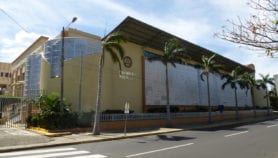By: Andrew Williams
Send to a friend
The details you provide on this page will not be used to send unsolicited email, and will not be sold to a 3rd party. See privacy policy.
A major international conference designed to review progress on chemical weapons abolition has ended without addressing the potential use of toxic chemicals in law enforcement to temporarily incapacitate people.
The news comes as indications are rising that Syrian government forces have used chemical weapons within their own borders in the current civil war.
The Chemical Weapons Convention entered into force in 1997. In all, 188 nations, including China, India and the United States, but not Syria, have agreed to abide by it.
SPEED READ
- A section on the use of incapacitating chemicals was dropped from the final convention update document
- There was no discussion of ways to deliver riot-control agents
- But terrorists not nations offer a bigger chemical weapon threat, warns an expert
Although the final document of the Third Review Conference of the States Parties of the Chemical Weapons Convention, held this month (8–19 April) in The Hague, Netherlands, has yet to be released, participants say that a key paragraph relating to the use of ‘incapacitants’ has been dropped from the convention.
"Of particular concern was the failure of the conference to address the potential development and utilisation in law enforcement of a range of toxic chemicals intended to cause temporary incapacitation," says conference attendee Michael Crowley, project coordinator of the Bradford Non‐Lethal Weapons Research Project at the University of Bradford, United Kingdom.
According to a report of the meeting by CBW Events, a project to record significant events related to chemical and biological weapons, state representatives had informally agreed the wording around this issue.
However, the US delegation subsequently highlighted legal issues requiring guidance from Washington. This did not arrive in time, so the agreed language had to be dropped from the final document, as there was no consensus.
Crowley also explains that the conference did not address the issue of ‘wide-area’ riot control agent (RCA) delivery mechanisms that are "capable of dispersing significant amounts of riot-control agents over wide areas and extended distances".
Although the convention bans RCAs’ use in warfare, states are permitted to make, acquire and utilise technologies to deliver appropriate types and quantities of RCAs for law enforcement.
"There is continuing ambiguity as to the type and specifications of those RCA means of delivery that are prohibited under the convention. This ambiguity has potentially dangerous consequences, allowing divergent interpretations, policy and practice among states parties to emerge," says Crowley, who also presented a research report on the subject, called ‘Drawing the Line’, at the conference.
"Despite evidence of the development and promotion of a range of wide-area RCA means of delivery that are potentially in conflict with the convention, the OPCW has declined to act. Given the evident dangers arising from unregulated production, proliferation and misuse of wide-area RCA means of delivery, the OPCW should address this issue as a matter of urgency," he adds.
Meanwhile, the author of a Nature comment article, which was timed to coincide with the conference, has also stressed the importance of improving the monitoring of research on incapacitants and RCAs, as well as the need to keep a close eye on the development of ‘flow micro-reactors’ — in essence, small factories that militant groups can use to make chemical weapons.
"I am quite confident that in the future, the risk from chemical weapons will not be caused by acts of states and countries, but of groups of terrorists," says the paper’s author, Leiv K. Sydnes, a chemistry professor at the University of Bergen, Norway.
"The key to coping with this risk is to keep proper track of movements of certain chemicals and chemical reactors, and use modern data technology to analyse such information and predict when there are reasons to believe it is time to act.
"In many developing countries, such surveillance will require changes of laws, regulations and practice, which means that the politicians now have some important work to do to safeguard the lives and wellbeing of the people they are supposed to serve," he tells SciDev.Net.
Link to ‘Drawing the Line’ report
Link to Chemical Weapons Convention













